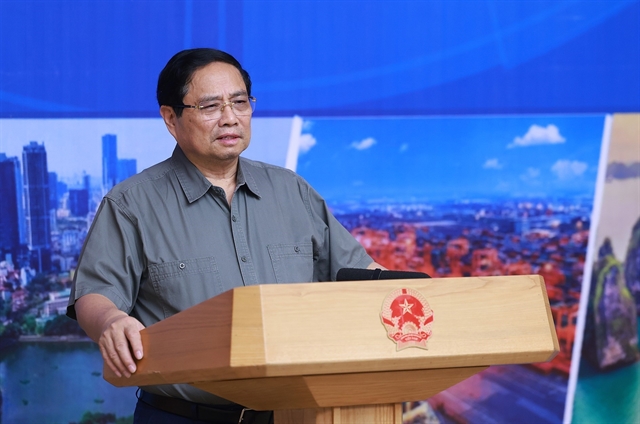 Politics & Law
Politics & Law


|
| Prime Minister Phạm Minh Chính chairs the sixth meeting of the Red River Delta Coordinating Council. — VNA/VNS Photo Dương Giang |
HÀ NỘI — Prime Minister Phạm Minh Chính has called on the Red River Delta to affirm its pioneering role in driving Việt Nam’s socio-economic development as the country enters a new stage of growth.
Concluding the sixth meeting of the Red River Delta Coordinating Council on Saturday, Chính, who also chairs the Council, said the region must take the lead in three areas — driving rapid and sustainable development to improve living standards, restructuring its economy towards green, digital, circular and knowledge-based growth, and building modern two-tier local administrations that serve the people while strengthening investor confidence.
The PM said ministries and localities must remove institutional bottlenecks, step up planning and infrastructure investment, and mobilise resources through stronger public-private partnerships. He underlined that land, resources and minerals are national assets under State management, and must be used equitably and effectively to support development.
He also urged greater promotion of science, technology, innovation and digital transformation, faster settlement of long-delayed projects, and stronger efforts in environmental protection and social welfare. Expanding social housing, linking heritage and tourism, and developing the cultural industries were also highlighted as priorities.
Calling this a new beginning with fresh opportunities and challenges, the PM said every ministry, sector and locality must act as a firm link in building the Red River Delta into a dynamic growth pole that leads the national economy.
At the meeting, delegates affirmed the strategic importance of the Red River Delta in politics, economics, culture, defence and security. Despite global and domestic headwinds, the region has maintained strong momentum, topping the nation in multiple fields.
Its gross regional domestic product grew 9.32 per cent in the first half of 2025, the highest among the country’s six economic zones. In the first eight months, it attracted US$5.4 billion in foreign direct investment, accounting for nearly half the national total. State budget revenue reached more than VNĐ814.6 trillion ($30.7 billion), or 46.8 per cent of the country’s total, while export turnover hit $129.3 billion, equal to about one-third of Việt Nam’s exports.
The region also led in business development with nearly 42,800 new firms and achieved a public investment disbursement rate of 53.6 per cent. Localities including Hải Phòng, Quảng Ninh, Bắc Ninh and Ninh Bình posted growth of 10.5-11.2 per cent.
Bắc Ninh topped the nation in FDI and ranked second in exports, Hà Nội placed second in budget revenue, and Ninh Bình ranked third in public investment disbursement.
Delegates credited these achievements to improved legal frameworks, timely removal of obstacles, stronger coordination between ministries and localities, and growing confidence among investors.
However, they also pointed to persistent challenges, including a development model not yet aligned with potential or global trends, weak regional value chains, and slow progress in key projects such as the Ninh Bình–Hải Phòng expressway, Hà Nội’s Ring Road No. 4, and Quảng Ninh’s border-gate economic zones.
Chính called on ministries and localities to act with high determination and boldness, saying the Red River Delta must consolidate its status as a modern, dynamic region that leads the country’s development and makes a worthy contribution to national progress. — VNS




